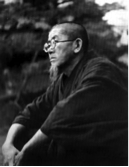 Taneda Santoka was a Japanese haiku poet who specialised in free verse haiku during the late 19th and early 20th centuries. He also translated works in French and Russian into Japanese.
Taneda Santoka was a Japanese haiku poet who specialised in free verse haiku during the late 19th and early 20th centuries. He also translated works in French and Russian into Japanese.
His birth name was Taneda Shoichi and he was born on the 3rd December 1882 in a small village on the southwestern tip of Honshu which is Japan’s main island. He had a comfortable upbringing as his family were well off landowners. Tragically though he lost his mother to suicide when only eleven years old. It was said that she threw herself into the family well as she could not cope with her philandering husband. Following this the boy was taken in by his grandmother who raised him.
At the age of 20 Taneda began studying literature at Waseda University in Tokyo. This was not a happy time as he frequently drank to excess and he soon dropped out of his studies. This coincided with the beginning of the Russo-Japanese war in 1904. Two years later his father sold some of the family’s land and used the proceeds to open a sake brewery and, wanting to see his son married, he arranged for Taneda to marry a girl from the next village. Memories of his dead mother’s body being recovered from the well had soured his relationships with women though.
His literary career took off when he published translations of the work of Guy de Maupassant and Ivan Turgenev in a literary journal called Seinen. He also had ambitions to write his own poetry and joined a local haiku group. His writing mostly took the form of the traditional syllabic format but occasionally he wrote in hypersyllabic, an example of this being:

In 1913 his efforts earned him a place studying under Ogiwara Seisensui who was the leading haiku reformist at the time, and was widely regarded as the originator of the free-form haiku movement. Within three years his family was facing financial ruin when his father went bankrupt due to the failure of his sake brewery. What had once been an affluent family was now in dire straits and Taneda found himself moving from location to location striving to secure paid employment connected with his writing. Tragic news followed him though with his grandmother dying, his younger brother committing suicide and then the death of his father.
His inability to settle to anything worthwhile led to another nervous breakdown to follow those from previous years. He suffered an earthquake while living in Tokyo and was also arrested under suspicion of being a communist. Perhaps he had stretched his fragile mental health right to the edge when, in 1924, he got blind drunk and jumped in front of a moving train. Perhaps someone was looking down on him with benign thoughts though; he survived this apparent suicide attempt and then found himself accepted into the Zen fraternity by the head priest of the Soto Zen temple Hoon-ji. Finally he found some peace and his life followed a smoother path from then on.
While on a number of walking trips, dressed in the typical priest’s robes, he wrote poetry and he begged at people’s houses for food and money, just to survive. He was not an ordained priest though so found this life very difficult and not really to his liking, and many people gave him nothing but scorn. He eventually gave up the wandering life and tried to concentrate on writing.
In all he produced seven collections of poetry in his lifetime. Here are a couple of examples of his free-style haiku, much of which had references to drinking in them:

Perhaps, having lived such a tempestuous life, it was ironic that Taneda Santoka died peacefully in his sleep on the 10th October 1940. He was 57 years old.

